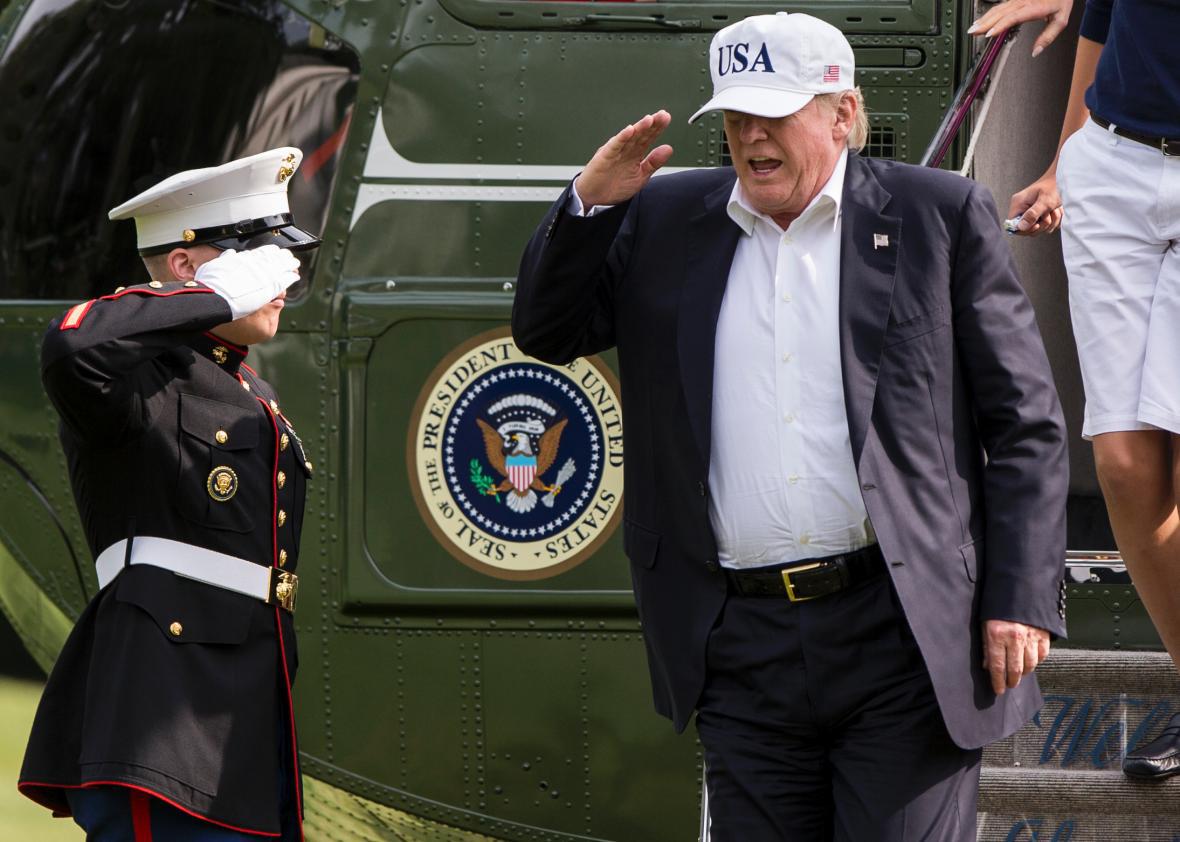Want to listen to this article out loud? Hear it on Slate Voice.
On Monday morning, the American Civil Liberties Union and Lambda Legal filed separate lawsuits against Donald Trump’s ban on transgender troops, alleging that the policy violates the United States Constitution. Each group filed in federal district court—the ACLU in Maryland, Lambda in Washington state. (OutServe-Servicemembers Legal Defense Network is co-counsel to the Lambda suit.) Two other civil rights groups filed a similar suit earlier in August, meaning there are now three lawsuits in three different courts challenging the ban. This barrage of suits is a coordinated strategy by the LGBTQ legal community designed to heighten the odds of a favorable ruling and, eventually, Supreme Court review. It’s a high-stakes bet, but these groups really have no other choice: The federal judiciary is their last best hope for shielding trans service members from the president’s political crusade against them.
Trump first announced his trans troops ban via Twitter, without consulting the Pentagon, after concluding that it would benefit him politically. Two weeks later, the National Center for Lesbian Rights (NCLR) and GLBTQ Legal Advocates & Defenders (GLAD) sued to block the ban—which had not yet been implemented—in a federal court in Washington, D.C. Then on Friday evening, Trump issued a memo barring the military from recruiting trans troops or paying for gender-confirmation surgery, and directed the secretaries of defense and homeland security to create an anti-trans policy.
Up to 15,000 transgender troops currently serve in the military; the Pentagon invited them to serve openly more than a year ago. Trump’s memo instructs Defense Secretary James Mattis and Acting Homeland Security Secretary Elaine Duke to “determine how to address transgender individuals currently serving in the United States military,” leaving their fate uncertain. (A purge of trans troops would cost about $960 million; the annual cost of gender-confirmation surgery in the military is roughly $5 million.)
All three lawsuits argue that Trump’s ban infringes upon transgender individuals’ due process and equal protection rights. The Lambda suit also argues that the policy violates service members’ free speech rights by preventing them from “expressing and conducting themselves consistently with their gender.” (That’s probably not a winning argument given the latitude that courts typically give the military to regulate expression.) Both Lambda and the ACLU assert that the courts should examine Trump’s ban under heightened scrutiny as either sex discrimination or an attack on a disadvantaged minority. All three lawsuits argue that at a bare minimum, the policy capriciously denies trans individuals a constitutionally protected liberty interest for no legitimate purpose.
Given the similarities between each complaint, why did these advocacy groups decide to file three suits instead of throwing their resources into one? That’s a strategic move. The ACLU filed in Maryland, within the 4th U.S. Circuit Court of Appeals; Lambda filed in Washington state, within the 9th U.S. Circuit Court of Appeals; and the NCLR and GLAD filed in the District of Columbia, within the U.S. Circuit Court of Appeals for the District of Columbia. Filing in three courts within three circuits gives these groups a better chance of obtaining at least one ruling in their favor. It also raises the possibility of a “circuit split,” wherein different courts of appeals issue clashing rulings. The Supreme Court usually steps in to resolve circuit splits, so this tactic may put the ban on the fast track to the Supreme Court.
But SCOTUS could also intervene earlier. If a district court quickly blocks the policy nationwide and a circuit court upholds in its injunction, the Trump administration will ask the justices to put the injunction on hold as the case is litigated on its merits. That will give us an early peek into the Supreme Court’s leanings. As usual, this case likely comes down to Justice Anthony Kennedy, presuming he’s still on the court when it gets there. And although Kennedy has sided against trans rights in the past, this case presents an unusual circumstance: If the justices maintain an injunction against the ban, they would simply preserve the status quo. SCOTUS would not be forcing the military to change its policy; it would be forcing the military to maintain a policy that has operated smoothly for more than a year.
Would the justice who wrote so eloquently of the “equal dignity” of gay people jeopardize his legacy by rubber-stamping an unjust and unjustifiable policy that is so obviously motivated by pure animus? It is difficult to imagine Kennedy doing so. In fact, this case could present him with his first opportunity to rule forcefully against the Trump administration’s all-out assault on LGBTQ rights—and declare that even in the Trump era, our Constitution demands nothing less than equal dignity for all.
